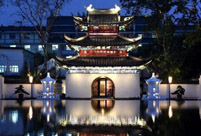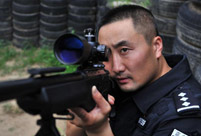 YOG kicks off in Nanjing
YOG kicks off in Nanjing
 Colorful life at Youth Olympic Village of Nanjing 2014 YOG
Colorful life at Youth Olympic Village of Nanjing 2014 YOG
 Royal Taoist temple to open to public
Royal Taoist temple to open to public
 Female soldiers at quake-hit area
Female soldiers at quake-hit area
 Shocking photos of cruel battles in Ukraine
Shocking photos of cruel battles in Ukraine
 Amphibious armored vehicle unit conducts open sea drill
Amphibious armored vehicle unit conducts open sea drill
 Water relay in Henan
Water relay in Henan
 Ethnic culture feasts eyes of travelers
Ethnic culture feasts eyes of travelers
 80 security dogs assembled in Nanjing police dog training base
80 security dogs assembled in Nanjing police dog training base
 Graffiti artists paint on street walls in Xinjiang
Graffiti artists paint on street walls in Xinjiang
LEGACY
For Nian Guangjiu, 77, Deng's policies changed not just his destiny but those of his children and grandchildren. Born into a rural family in east China's Anhui Province, Nian was able to sell sunflower seeds roasted with skills he developed by himself thanks to Deng's policies. Compared with seeds roasted by state-run factories, "Shazi" products were delicious and inexpensive, and quickly became more popular.
Nian's small business expanded till he employed more than 100 people. He made a million yuan in the 1980s, an enormous amount of money in China of that time, and all impossible without reform and opening up. In 2001, his entrepreneurial son Nian Qiang started promoting the brand to more than 2,000 stores and invested 170 million yuan in a production base.
"To develop the company, I had to reform the management style adopted by my father two decades before," Nian junior said. He is now planning to purchase an American company and crack a bigger chunk of the nut market.
In a speech in 1992 on his landmark "southern tour", Deng urged officials to be bold in reform and have the courage to experiment. "We must not act like women with bound feet," he famously said, echoed by Xi during the third plenum of the 18th CPC Central Committee when he said the CPC must win the tough battle of comprehensively deepening reforms. Xi frequently displays a similar practical attitude to that of Deng in grappling with thorny problems.
"Empty talk will lead the country astray, and hard work can rejuvenate the nation," Xi said; another of Deng's phrases from his 1992 inspection tour in southern China.
Nian Qiang's daughter Nian Zijun, went to Hong Kong to learn industrial and commercial management, but established an English training center after graduation. The Nian family is building a Shazi sunflower seed museum to commemorate Deng's contribution to China.
"The government is showing determination in reforms. I am very confident for the future of private enterprises," Zijun said.
TIMES ARE CHANGING
In the late 1970s, Deng put forward a three-step development strategy.
After the first two steps, hundreds of millions of Chinese people were lifted out of poverty and the country became a linchpin of global commerce.
In previous years China pursued economic growth regardless of the cost to the environment and the widening wealth gap. Now the focus has moved away from pure growth and stepped onto a more rational development path to address these imbalances.
"The Chinese Dream," a concept targeting "the great renewal of the Chinese nation", was put forward by Xi shortly after he took helm of the CPC in November, 2012, but dreams do not come to fruition without hard work.
Chinese leaders are acutely aware of what is at stake. Having been "the factory of the world", they want to avoid the so-called "middle-income trap" which has bedeviled so many developing countries.
After more than three decades since Deng first propelled China toward the world at large, the Shanghai pilot free trade zone (FTZ) opened in September last year to nurture innovations in a wide range of commercial areas: a convertible yuan, opening up of 18 service sectors, a negative list approach to foreign investment, and numerous other initiatives, are expected to bear fruit within two to three years. By the end of July, over 1,000 foreign businesses had set up in the FTZ, which is creating a nationwide opening-up fervor and driving reform.
"Opening up, delegating power and benefiting the people are the watchwords of what Deng Xiaoping started," said beverage tycoon Zong Qinghou, CEO of Wahaha. "They have brought great vitality of hundreds of millions of Chinese people and will continue to do under the new leadership."
The CPC is tackling obstacles on the road to rejuvenation by modernizing its governing system, the so-called fifth modernization following agriculture, industry, defense and scientific research raised by Deng.
Efforts range from the fight against corruption through food safety to cleaner air and safe drinking water for all.
In October, a key CPC meeting will focus on the rule of law, which can ensure society remains orderly and thrives during such profound change.
"As reform enters the 'deep water zone', we need the daring spirit of Deng's era," said CPC party school professor Xie. "In Xi and his team, we see political courage and wisdom at the time when we need it most."
 |
 Beautiful night scenery of Nanjing
Beautiful night scenery of Nanjing Passenger transport starts on Tibet's new railway
Passenger transport starts on Tibet's new railway Story of outstanding Beijing swat sniper
Story of outstanding Beijing swat sniper Beautiful policewoman in an anti-terrorism SWAT team
Beautiful policewoman in an anti-terrorism SWAT team Cute photos of little Taoist nuns and monks go viral online
Cute photos of little Taoist nuns and monks go viral online Amphibious armored vehicle unit conducts open sea drill
Amphibious armored vehicle unit conducts open sea drill A post-90s girl who takes grandma to work
A post-90s girl who takes grandma to work Beijing policewomen posters become a hit
Beijing policewomen posters become a hit The vanishing folk skills
The vanishing folk skills Intoxicating beauty of Dali, Yunnan province
Intoxicating beauty of Dali, Yunnan province Memorable moments of Ludian earthquake
Memorable moments of Ludian earthquake Bring world together to help elephant
Bring world together to help elephant 'Building Dreams'
'Building Dreams'  Labrang Monastery
Labrang MonasteryDay|Week|Month